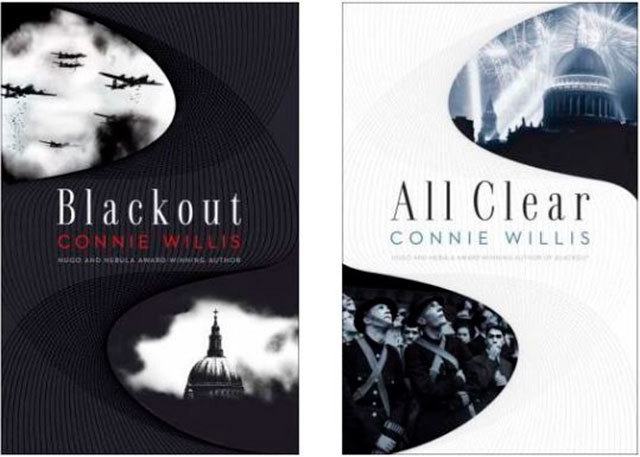By Ron, Everett Public Library staff
Reading a good book can be fabulous and depressing all at once. Page turners, stories that can’t be put down, books that demand to be picked up again, all can leave a reader wanting more. Perhaps it’s a sad commentary on my psyche that I grow so attached to the characters in a book, but on the other hand gifted authors paint such vivid, realistic pictures that their characters practically jump off the page.
Enter gifted author Connie Willis. Classified as a sci-fi writer, Willis writes books that are really historical fiction with a bit of sci-fi thrown in. Her Oxford Time Travel series uses, wait for it, time travel to get characters to a particular point in history, and then the stories become almost entirely historical fiction. And what stories they are! Doomsday Book finds a time traveler trapped in a village during a bubonic plague outbreak. Here Willis creates a world where you-the-reader actually feel that you’ve experienced the insane hardships of the black death.
As amazing as this book is, today I want to discuss Blackout and All Clear, two books which really are just one book split into two. In this adventure, time travelers (called historians) from 2060 go to various points in WWII England to observe and study. Initially, the story jumps around quite a bit between 2060 Oxford and each of the traveler’s adventures. As stories begin to intertwine, three historians who are on separate assignments in 1940 gradually discover that they cannot return to 2060. They start looking for each other (not an easy task in the middle of a world war), each of them incorrectly assuming that the others still have access to the future. Thus the story ends up focusing on Polly, Eileen and Mike in London from mid-1940 to mid-1941.
As much as one can know facts about WWII, there’s no way to know what it was like living through it without having done so. And although Willis’s books are fiction, they thoroughly immerse the reader in the mindset of Londoners during the war. Terror and uncertainty caused by the blitz, loss of loved ones at any given moment, annihilation of homes, daily bombings, destruction of roads and railways and on and on.
But perhaps more than the negative impacts of war, we are shown the resilience of the British. Throughout eight solid months of bombing, people continued going to jobs, shopping, celebrating Christmas and living life day to day. I can’t even begin to imagine the numbing difficulty of living through such an event. And yet live they did.
There is also a sci-fi component to the stories with each of the main characters worried that they might change history (seriously, no one considered this in the 40 years that time travel had been happening?), that they could even cause Hitler’s Germany to win the war. In fact, they are obsessed with this issue. After the time travel process stops working, the three fear that their actions have somehow caused its failure. And to top that off, Polly had earlier in her life gone back to May 1941, so she must return to 2060 before then or the laws of physics and time travel will eradicate her. So we have a thriller that exists on several different levels simultaneously.
When I finished All Clear (some thousand pages later), I felt an emptiness because the end of the book was the end of my relationship with the book’s characters, people who took me through life-changing adventures. In a small way, it paralleled the end of the war when people who had grown so close returned to their normal lives without their wartime families. Happy that the war was over, sad that the experiences which forged strong bonds had ended.
Bittersweet.
Fabulous, depressing, wondrous and fleeting. This is the literary world. So read a good book, make new fictional friends and mourn their departures as the book concludes.
And then, repeat.
Be sure to visit A Reading Life for more reviews and news of all things happening at the Everett Public Library.
Talk to us
> Give us your news tips.
> Send us a letter to the editor.
> More Herald contact information.

























